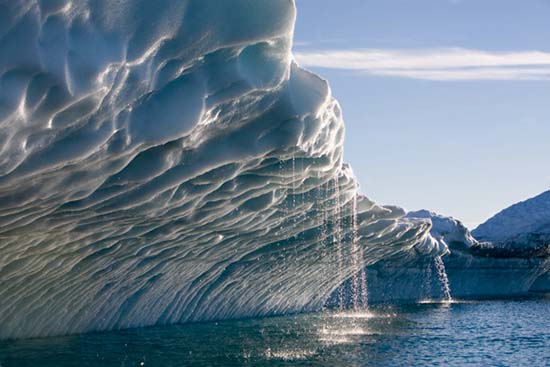Global warming has terrible consequences
Global warming can wipe out ¾ of the ice sheets in the highlands of Europe by 2100 and raise the sea level by 4m by 3000.

Those are the predictions made in two studies of the terrible consequences of global warming.
The content of these studies focuses on the two least-understood aspects of the environmental impact of the trend: how the glaciers will be affected, as well as the time and place of occurrence, and the problems themes that many generations of people will face in the future.
Accordingly, the study of glaciers predicts that the ice layers and ice caps on the mountain will decrease by an average of 15 to 27% by 2100.
' Extensive ice melting can cause terrible impacts to regional water sources ,' AFP warned in a study by the University of Alaska (USA). Some places will suffer more violent consequences than other regions due to the height of the glacier, natural terrain .
New Zealand may lose up to 72% (65 to 79%) of the country's ice sheets. Greenland melting is expected to be around 8% and this rate is about 10% in the high mountains in Asia.
As a result, sea level will rise about 12cm by 2100 , according to the report. That number, not including the expansion of the oceans in warmer climates, is quite similar to the results of the Fourth Assessment Report carried out by the UN Climate Change Commission in 2007.
Geophysicists Valentina Radic and Regine Hock of the University of Alaska drew this conclusion based on computer-based calculations built from the data of more than 300 glaciers from 1961 to 2004. Accordingly, Earth's surface temperature may increase by 2.8 degrees Celsius in the 21st century due to greenhouse gas emissions.
After building the model, experts applied this method to measure 19 regions containing glaciers and ice caps around the world, except for ice shelves in Antarctica and Greenland, which hold up to 99% of the volume. Fresh water in the world.
If the Antarctic and Greenland ice sheets also melt along, the sea level will increase in meters rather than centimeters, submerging many coastal cities . This is the scenario that the second study addresses, which focuses on the inertial effects of greenhouse emissions.
Carbon molecules emitted from burning fossil fuels and forest fires can survive in the air for centuries before decomposing. Even if countries succeed in preventing carbon emissions by 2100, global warming continues for hundreds of years, according to the University of Calgary (Canada).
The University of Calgary study is based on the prospect of an average temperature of about 3.4 degrees Celsius at the end of the century. After analyzing the inertial forces of ocean currents that flow into the southern Atlantic Ocean, Professor Shawn Marshall said the oceans are beginning to warm up as a result of CO2 emissions from the last century.
Computer models show that this situation will continue to occur within a time span of thousands of years. Consequently, sea water can rise to 4m in 3000, according to Professor Marshall.
- Scotland faces 'apocalypse' because of global warming
- 8 unknown consequences of climate change
- Global warming delays the next ice age
- Global warming can erase the Olympics since 2085
- Video: 135 years of global warming summed up for more than 30 seconds
- The reason for the worsening winter is despite the global warming climate
- Warming earth affects microbial life underground
- Cover the sun to block ... global warming
- Where will the sea level be highest due to global warming?
- Nature helps curb the global warming
- Global warming threatens the safety of flights
- Two Vietnamese granaries will be submerged in the sea after 5 years?
 Is the magnetic North Pole shift dangerous to humanity?
Is the magnetic North Pole shift dangerous to humanity? Washington legalizes the recycling of human bodies into fertilizer
Washington legalizes the recycling of human bodies into fertilizer Lightning stone - the mysterious guest
Lightning stone - the mysterious guest Stunned by the mysterious sunset, strange appearance
Stunned by the mysterious sunset, strange appearance